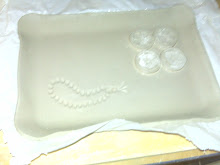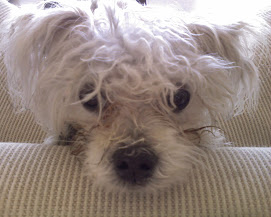Last night, I met one of my heroes. Dr. Carl Hammerschlag is a Psychiatrist trained on the East Coast who has worked many years with Native American populations in the Southwest. He has written books about how to get in touch with the true healer within. In addition, he publishes a great blog called Schlabytes.
Dr. H lives in Phoenix and Lisa, one of his daughters, teaches yoga at a studio where I occasionally practice. The two of them decided to host a workshop combining his gift for storytelling and her gift for dynamic yoga. I am usually a middle to back row yoga student, but last night, I brought my yoga mat right to the front row - I wanted to be as close to the Storytelling as possible.
Dr. H did not disappoint. He opened up the evening with a story about a Native American man, sitting in a teepee with his grandson. The grandson noticed his grandfather staring intently into the fire, and thinking he was upset, the grandson asked, "Grandfather, why are you upset?" The grandfather told his grandson, "I have two dogs nibbling at my heart. One dog is fear, and the other is love. They are both slowly nibbling away at my heart." The grandson candidly asked, "Which one will win, grandfather."
And his grandfather said, "The one that I feed."
After Dr. H's introductory metaphor, we partnered with another yogi in the room, did a few partner stretches, and then shared a candle lighting experience. As we ended this section, Dr. H reminded us of the practical wisdom of the word "Namaste" - to look for others whose inner lights remind us of the light inside of ourselves.
For the next hour, Lisa, Dr. H's daughter, guided us through her energetic style of yoga. We swayed back and forth, threw our arms into the air and even shook our bon bons, all in time to dance and yoga music. This was not the yoga I was used to, but Lisa's enthusiasm was truly contagious. After ramping up our energy, and then slowing us back down, she returned us to a place of comfort and openness from which to sit and enjoy for her father's stories.
As Dr. H rose to begin his part of the workshop, I opened my journal and prepared to jot down whatever Schlagbytes I could capture. I have included a few below. He spoke for "35 minutes of uninterrupted Hammerschlag" and opened up the floor for questions.
At the end of the evening, I approached Dr. H with a copy of one of his books and asked him to sign. We spoke a bit about practicing medicine and then I shook his hand, telling him what a true pleasure it had been to share this experience with him. He was gracious and humble.
A few Schlabytes:
- Take leaps of faith, not leaps of certainty. Dr. H encourages us to avoid making moves from a point of certainty. He ascertains that one's future will no doubt be a repeat of the past if one always insists on acting from a place of certainty. Instead, he encouraged us all to take risks, and move from a place of vulnerability, as this is the only real opportunity for new growth.
- You must learn to dance in order to heal. Dr. H is the son of Holocaust survivors. For much of his life, he harbored what he considered a justifiable anger toward Germany. It was not until he came to Native American country, where he was labelled a "White Man" and blamed for past atrocities towards Native people, that he realized he needed to explore his own feeling towards Germans. On one of many proceeding trips to Germany, Dr. H was at a World Cup Soccer game where a young German man, draped in a German flag, lured him into a celebration dance in the street. Dr. H could not help himself - as he joined the young man in his dance, celebrating a German soccer win, Dr. H realized that he had finally learned his healing dance.
- You must ask for what you need from others. Dr. H points out that most of us are terrible at asking for what we need. Instead of directly saying to someone, "I need you to do this for me," we drop hints and act in ways that suggest what we want. When we don't get what we want, most of us blame the other person's stupidity, or inability to interpret our many hints and indirect gestures. The truth of this scenario is that the only person to blame for not getting what we want is ourselves - for not having the ability to ask.
- If it doesn't feel good, you are doing it wrong. This is what Dr. H's wife told her daughters during their first "sex talk". This bit of a wisdom has many other applications in life - and Dr. H summarized these by saying, "Don't subordinate your own feelings by letting someone else to tell you what you should or shouldn't feel."
Saturday, October 24, 2009
Friday, October 9, 2009
Health as a Teacher
I never realized how much more I relate to others when their experience is negative, sad or depressing, until I was diagnosed with rosacea. Rosacea is a skin condition that is "chronic and incureable" - I have had this condition for my entire life, it has waxed and waned since my teenage years and recently reappeared in my adulthood. It usually appears on the face, and is therefore very distressing for those it affects. Many treatment options are available, most offering mediocre results at best. Physicians are encouraged to "supplement medical treatment with patient reassurance" as "many patients suffer from low self confidence".
Ughhh - my damaged skin literally crawled as I read this research. I don't necessarily suffer from low self confidence, but who wants a chronic incureable disease that impairs your physical appearance, your face in particular, and does not respond to treatment?! With the reemergence of this condition in my adulthood, I became obsessed with it. As is my habit, I began repeating these frustrating facts over and over in my head, also telling my friends and family about my whoa's, ultimately making myself more and more anxious about my skin.
What I did not repeat in my head was that the condition is neither disabling nor life threatening. It is occasionally uncomfortable and embarassing, but it does not TRULY interefere with a person's ability to work, play or interact with others. Those who despair incessantly over their physical appearance may hate going to work during a flare up, or may be less likely to go to dinner with friends, but these denials of normal life have more to do with a person's REACTION to the condition, and not the condition itself. When I am at my worst, I chose to ignore these encouraging facts and instead focus on things that perpetuate my feelings of anxiety and depression.
I recently signed onto a blog of people who suffer from rosacea. Their comments were not encouraging - most stated that they had used several treatments over a years time with no improvement. Story after story fed into my own sense of helplessness! Their stories stayed with me for a few days, until I realized something vital about the bloggers - where were the success stories? It was easy to think that every person with rosacea was losing the battle. I began to consider that it was it largely the people with negative experiences that sought out the blog. Maybe, those with success stories were too busy living their lives to post on a blog?!
Slowly but surely, my rosacea success story has unfolded. As is the case with most challenges in our lives, this skin problem of mine has led to some positive changes in my life. So far it has motivated me to give up dairy (aghhhh - I love cheese!!!) and decrease my alcohol intake (ouch - I love wine!!!!), two known triggers for flare ups. I still feel some degree of hopelessness and frustration, and I still secretly obsess over the subtle changes in my skin on an hourly/daily basis ("Can someone hand me a mirror, I feel the need to obsess over my skin..."). But I am learning to be more patient with treatment options over time, less fearful of what other's think, and more responsible for my state of mind. Energy follows thought, and even minor health problems can serve as practice for redirecting your thoughts towards more positive things.
Ughhh - my damaged skin literally crawled as I read this research. I don't necessarily suffer from low self confidence, but who wants a chronic incureable disease that impairs your physical appearance, your face in particular, and does not respond to treatment?! With the reemergence of this condition in my adulthood, I became obsessed with it. As is my habit, I began repeating these frustrating facts over and over in my head, also telling my friends and family about my whoa's, ultimately making myself more and more anxious about my skin.
What I did not repeat in my head was that the condition is neither disabling nor life threatening. It is occasionally uncomfortable and embarassing, but it does not TRULY interefere with a person's ability to work, play or interact with others. Those who despair incessantly over their physical appearance may hate going to work during a flare up, or may be less likely to go to dinner with friends, but these denials of normal life have more to do with a person's REACTION to the condition, and not the condition itself. When I am at my worst, I chose to ignore these encouraging facts and instead focus on things that perpetuate my feelings of anxiety and depression.
I recently signed onto a blog of people who suffer from rosacea. Their comments were not encouraging - most stated that they had used several treatments over a years time with no improvement. Story after story fed into my own sense of helplessness! Their stories stayed with me for a few days, until I realized something vital about the bloggers - where were the success stories? It was easy to think that every person with rosacea was losing the battle. I began to consider that it was it largely the people with negative experiences that sought out the blog. Maybe, those with success stories were too busy living their lives to post on a blog?!
Slowly but surely, my rosacea success story has unfolded. As is the case with most challenges in our lives, this skin problem of mine has led to some positive changes in my life. So far it has motivated me to give up dairy (aghhhh - I love cheese!!!) and decrease my alcohol intake (ouch - I love wine!!!!), two known triggers for flare ups. I still feel some degree of hopelessness and frustration, and I still secretly obsess over the subtle changes in my skin on an hourly/daily basis ("Can someone hand me a mirror, I feel the need to obsess over my skin..."). But I am learning to be more patient with treatment options over time, less fearful of what other's think, and more responsible for my state of mind. Energy follows thought, and even minor health problems can serve as practice for redirecting your thoughts towards more positive things.
Subscribe to:
Posts (Atom)








